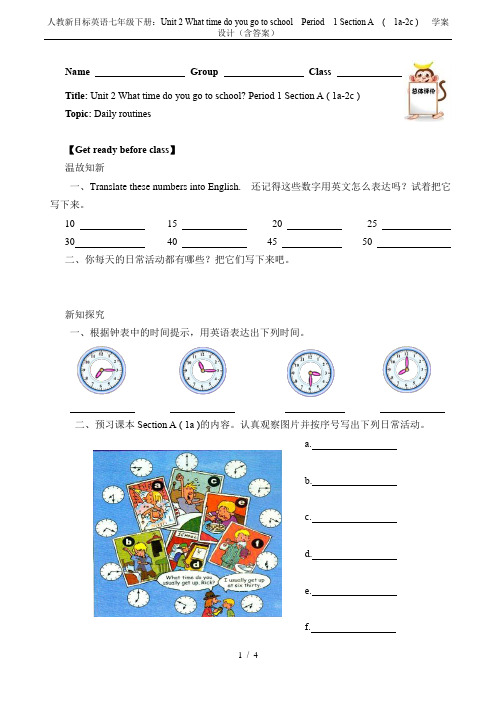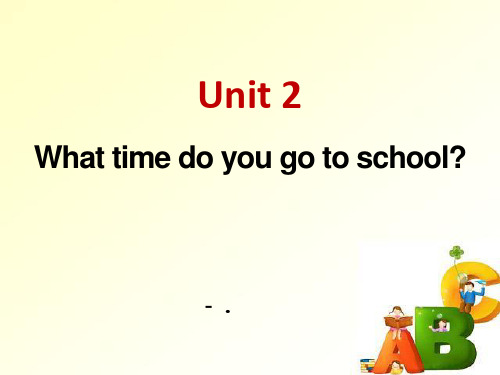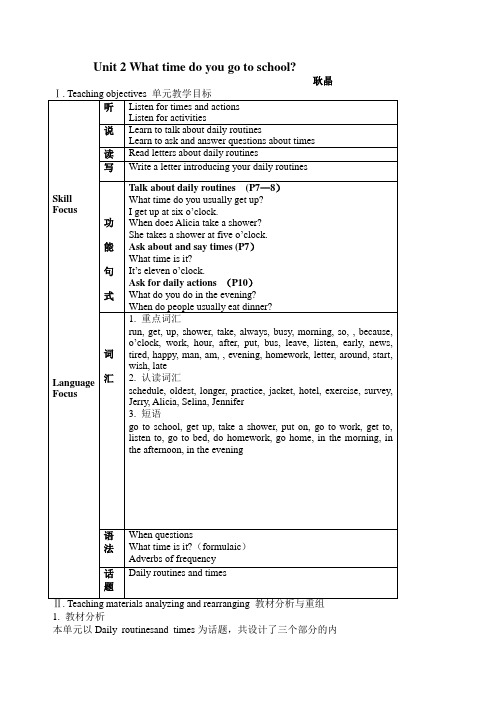人教新目标七年级英语(下)unit2whattimedoyougotoschool基础知识检测试题(答案不完整)
人教新目标英语七年级下册:Unit 2 What time do you go to school

Name Group ClassTitle: Unit 2 What time do you go to school? Period 1 Section A( 1a-2c )Topic: Daily routines【Get ready before class】温故知新一、Translate these numbers into English. 还记得这些数字用英文怎么表达吗?试着把它写下来。
10 15 20 2530 40 45 50二、你每天的日常活动都有哪些?把它们写下来吧。
新知探究一、根据钟表中的时间提示,用英语表达出下列时间。
二、预习课本Section A( 1a )的内容。
认真观察图片并按序号写出下列日常活动。
a.b.c.d.e.f.三、翻译:下列句子。
1. --- What time do you usually get up, Rick?--- I usually get up at six thirty.2. 你通常什么时候洗淋浴?我通常在6:40 洗淋浴.3. ---吉姆什么时候洗淋浴?---他总是在七点洗淋浴。
四、预习指南:时间表达法1. 直接表达法:1) 用“基数词 + o'clock”(o'clock可省略)表示整点。
如:eight o'clock 八点钟,ten (o'clock) 十点钟2) 用基数词按钟点+ 分钟的顺序直接写出时间。
如:eleven five 十一点过五分,six forty六点四十2. 间接表达法1) 如果分钟数少于等于30分钟,可用“分钟+ past + 钟点”表示,如:twenty past four 四点二十2) 如果分钟数多于30分钟,可用“(60分钟-原分钟数)+ to +(原钟点数+1)”表示,其中to是介词,意思是“差”。
如:8:35 twenty-five to nine注:①当分钟数是15分钟时,可用名词quarter(一刻钟)表示。
2017人教新目标版英语七下Unit 2《What time do you go to s

4. ________________
How long Sandy watches TV
5. ________________
写 前 指 导
一、根据文章内容,完成下列信息卡。
Half past six
For an hour
Five
In the concert hall
Having dinner
写 前 指 导
二、重点词汇积累。6. 每天 _________________________ 7. 快速洗个澡 ____________________8. 上学迟到 _____________________ 9. 弹钢琴 _______________________10. 回家 ________________________ 11. 在晚上 ______________________12. 做作业 ______________________13. 忙碌的一天 ___________________
思 路 点 拨
(省略)
__________________________________________________________________________ _____________________________________
写 前 指 导
home. In the evening, first she has dinner at six twenty, and then she does her homework at half past seven. From nine o’clock to nine thirty, Sandy either reads books or watches TV for an hour, then she goes to bed. What a busy day she has!
人教新目标版七年级英语下册课件《Unit 2 What time do you go to school Period 1》课件

4.互助巩固--师友巩固
your busy morning
A: What time do you usually …? B: I usually … at …
get up
get dressed
brush teeth
6. take a shower _a__
3.拓展提高--师友听练
Look, listen and learn
get up
get dressed eat breakfast
go to school
brush teeth take a shower
1b Listen and match the times with the actions.
……
A: What time do you go to school?
B: I usually go to school at seven o’clock.
4.互助巩固—教师强调
1. 点钟数 + 分钟数
eg: 6: 15 six fifteen 7: 29 seven twenty-nine
2. 分钟数 + past +点钟数(分钟数不超过30分)
take a shower eat breakfast go to school
Ask and answer questions about Rick’s day.
A: What time do you usually take a shower, Rick?
B: I usually take a shower at six forty.
Section A
七年级新目标下Unit_2_What_time_do_you_go_to_school教案

Unit 2 What time do you go to school?耿晶1. 教材分析本单元以Daily routinesand times为话题,共设计了三个部分的内容。
旨在通过单元教学使学生学会谈论日常行为、询问并答复有关时间的问题、询问并回答人们在特定时间所从事的活动。
Section A 学习谈论日常作息时间。
1a, 1b, 1c 重点学习和学生息息相关的几种日常行为的英文表示方法,学会询问和答复日常作息时间。
2a, 2b, 2c ,2d继续学习谈论自己或他人的日常作息时间。
重点学习如何询问,这也是本单元的语法重点。
3a, 3b, 3c 学会叙述他人的日常活动安排,同时学习询问时间和时间表达法,进一步巩固询问别人的日常作息时间的表达法。
Section B 继续学习询问和谈论别人的日常行为。
1a, 1b, 2a, 1c,1d,1e,学会谈论和询问一天内各个时间段的活动安排。
2a,2b,3a,3b学会通过两个人的对比介绍来判断并养成好的作息时间。
Self check 重点单词句型复习2. 课型设计与课时分配Period 1 Listening and speaking (I)(Section A: 1a, 1b, 1c)Period 2 Listening and speaking (II)(Section A:2a, 2b, 2c,2d)Period 3 Integrating skills(Section A:3a, 3b, 3cSection B: 1a, 1b,1c,1d,1e)Period 4 Reading and writing(Section B:2a, 2b, 2c,3a,3b)Period 5 Self checkⅢ. Teaching plans for each periodPeriod 1 Listening and speaking(Ⅰ) Target language目标语言1. Words && phrases生词和短语Up,get up,dress,get dressed,brush,tooth,shower,take a shower,usually,forty, what time,2. Key sentences重点句子When do people usually ...? People usually ...What time do you usually ...? I usually ...Ability goals能力目标Enable students to learn to talk about daily routines.Learning ability goals学能目标Help the students learn how to talk about daily routines.Teaching important / difficult points教学重难点How to talk about daily routines.Teaching aids教具准备A tape recorder and a model clock.Teaching procedures and ways教学过程与方式Step ⅠWarming upIn this procedure, motivate students to learn some words and phrases by singing the songs they’ve learned before.T: Good morning, everyone. (sing) “Good morning to you. Good morning to you. Good morning, dear children. Good morning to you.” This song is easy to learn. Who can sing it to us?Encourage students to sing the song.T: Well done. Thank you! We sing “Good morning to you” in the morning. Then what do we sing in the afternoon and in the evening? S: We sing Good afternoon to you in the afternoon and Good evening to you in the evening.T: That’s right. I know all of you are very good at singing. Does anyone want to sing Good afternoon to you or Good evening to you to us?Step ⅡTalking and reading (1a)In this procedure, ask students to finish the required task and learn some key phrases about daily actions.T: As we all know, time is very important and in English there is a famous saying "An hour in the morning is worth two in the evening." So what do you do in the morning?S1: I read English. S2: I do morning exercise.T: And what do you do in the afternoon and in the evening?S1: I play basketball in the afternoon. S2: I watch TV in the evening.T: I’m very glad to hear that. You use your time very well. And there’re many daily things we can do. Now let’s read these phrases in 1a and match these actions and the time of day.Step ⅢPracticeIn this procedure, students will learn how to talk about actions and the time of day.T: I know you’re very clever. Now I want you to tell if my statements are right or wrong. First, I usually eat dinner in the morning. S: Wrong.T: When do I usually eat dinner? S: In the evening.T: Second, she gets up at 19:00 in the morning. S: Wrong.T: What is the correct way of saying the sentence? S: She gets up at 7:00 in the morning.T: How clever you are! Now let’s read the conversation in groups and see which group reads better.Ask students to do pairwork.T: Please ask your partner when people usually do these things: do homework, eat dinner, eat breakfast and go to bed.(Write “When do people usually ...”on the blackboard)Sample dialogue:S1: When do people usually do homework?S2: People usually do homework in the afternoon.Interest the students in going on practicing the conversation using a new way of reading.T: Now let’s try a new way of reading. First I name one student to ask a question, and then ask all of you repeat this question together. After that, I name another student to answer this question, and all of you repeat the answer together.Sample dialogue:S1: When do people usually go to bed?S: When do people usually go to bed?S2: People usually go to bed in the evening.S: People usually go to bed in the evening.Step ⅣTalking about time (1c)In this procedure, students will learn how to ask about and say hour times and learn some key phrases about daily routines.T: Boys and girls, please listen to what I’m saying and guess what it is. 小小骏马不停蹄,日日夜夜不休息,蹄声哒哒似战鼓,提醒人们争朝夕。
人教新目标七年级下册英语导学案Unit 2 What time do you go to school

承德四中年级学科导学案.主备人:审核人:审批人:编号:课题:Unit 2 What time do you go to school? 第一课时课型:听说课第一标:设置目标(5分钟)【学习目标】知识目标1:能掌握以下单词和短语:up, dress, brush, tooth (pl. teeth), shower, get up, get dressed, brush teeth,take a shower, go to school, eat breakfast2.能掌握以下句型:①—What time is it? —It’s ….②—What time do you usually get up? —I usually get up at six thirty.③—What time does Bob usually get up? —He usually gets up at five thirty. 第二标:达成目标(25分钟)学法指导1.Pairwork(要求学生两人一组练习。
): —What time is it? —It’s ….2. 听录音,完成活动1b,把时间与活动的匹配(组内检查)。
3.谈论日常生活:—What time do you usually get up? —I usually get up at six thirty.4.听录音,完成活动2a,2b(组内检查)。
小组内复述Jim一家的淋浴时间,第三标:反馈目标(15分钟)一. 根据汉语写单词、短语:起床_______________穿上衣服___________________洗淋浴_________________刷、刷净__________________牙齿(单、复数形式)________ __________二、翻译句子:Time is money. Time is life. Time flies. ______三. 单项选择:( )1. Tony usually gets up___5 o’clock. A. in B. at C. on D. about ( )2. —W hat’s the English for 8:10? —It’s ______.A. eight tenB. ten eightC. ten to eightD. eight past ten( )3. He_____up at 7:00 and_____the early morning news(新闻) on TV.A. gets, seesB. get, watchC. gets, watchesD.get, see( )4. What time _______she_______?A. do, go to schoolB. does, goes to schoolC. does, go to the schoolD. does, go to school( )5. _______does your father usually ____ a shower?A. What time, takesB. What’s time, takeC. What time, ta keD. What’s time, takes( ) 6.He gets up early. So he has ______ time for breakfast.A. manyB. a lotC. lots ofD. lot of四、句型转换。
人教版新目标英语七年级下册《Unit 2 What time do you go to school

人教版新目标英语七年级下册《Unit 2 What time do you go to school》教学设计3一. 教材分析人教版新目标英语七年级下册《Unit 2 What time do you go to school》主要围绕着日常生活中的时间安排展开。
本节课通过学习不同的时间表达方式,使学生能够灵活运用英语询问和描述日常作息时间。
教材内容丰富,包括对话、词汇、语法及任务型活动等,旨在培养学生的听说读写技能,提高他们的语言运用能力。
二. 学情分析七年级的学生已经掌握了基本的英语语法和词汇,具备一定的听说读写能力。
他们对新知识充满好奇心,善于模仿和交流。
但同时,部分学生可能对时间表达方式的掌握还不够熟练,需要教师的引导和练习。
三. 教学目标1.知识目标:学生能够掌握日常时间表达方式,如“What time do yougo to school?”、“I go to school at 7:00.”等;2.能力目标:学生能够在实际情境中运用英语询问和描述时间;3.情感目标:培养学生珍惜时间、合理安排作息的良好习惯。
四. 教学重难点1.重点:学生能够正确使用时间表达方式进行问答;2.难点:学生能够在实际情境中灵活运用时间表达方式。
五. 教学方法1.情境教学法:通过设定真实的生活情境,让学生在实际交流中学会运用时间表达方式;2.任务型教学法:设计各种任务活动,让学生在完成任务的过程中提高语言运用能力;3.互动式教学法:引导学生积极参与课堂互动,增强学生的自信心和合作精神。
六. 教学准备1.准备教材、课件和教学资源;2.设计相关任务活动和练习题;3.准备时间表、闹钟等教具。
七. 教学过程1.导入(5分钟)利用多媒体展示不同的时间场景,如早晨起床、上学、放学等,引导学生用英语描述这些场景。
2.呈现(10分钟)教师展示教材中的对话,让学生边听边跟读,掌握日常时间表达方式。
同时,教授时间词汇如“morning”、“afternoon”、“evening”等。
Unit 2 英语教案人教版新目标七年级英语下册
Unit 2 what time do you go to school?(Section A)教学目标:能够听懂、会说并正确使用日常生活中的时间表达方式。
能够用英语描述自己或他人的日常作息时间。
教学重点:时间表达方式。
熟练使用句型“What time do you...?”和“I usually... at...”。
教学难点:用英语描述自己或他人的日常作息时间。
区分at、in、on的用法。
教学准备:课件、多媒体设备。
钟表、日常生活用品图片等教具。
教学过程:Step 1: Warm-upShow some pictures of daily activities, such as getting up, having breakfast, going to school, doing homework, watching TV, and going to bed.Ask students to describe what they usually do at each time of day.Step 2: PresentationPresent some common time expressions, such as "in the morning", "in the afternoon", "in the evening", "at night", "at 6 o'clock", "at 7:30", and "on Monday".Explain the different uses of "at", "in", and "on".Step 3: PracticeHave students work in pairs to ask and answer questions about each other's daily routines using the sentence pattern "What time do you...?" and "I usually... at...". For example: "What time do you get up? I usually get up at 6:30."Ask some students to share their partners' routines with the class.Step 4: ProductionHave students work in pairs or small groups to create a schedule of their own daily routines.Ask some students to share their schedules with the class.Step 5: Culture CornerShow students a map of the world with different time zones marked on it.Explain how time zones work and the difference between a single time zone country like China and a multi-time zone country like the United States.Step 6: HomeworkAssign students to write a short paragraph about their own daily routines using the sentence pattern "I usually... at...".Encourage students to use the time expressions and sentence patterns they have learned in class.教学反思:本课重点介绍了日常生活中常用的时间表达方式和句型,通过让学生在实践中运用这些表达方式和句型,巩固了他们的学习成果。
Unit 2 What time do you go to school人教版新目标七年级下册英语优秀教学设计 初一教案有教学反思
UNIT 2 What time do you go to school?Section A 第1课时(1a~1c)自主学习方案1. 自学生词,并记住拼读及拼写。
2. 预习课本找出重点短语及句子。
(见学案自学导练内容)3. 读记后完成自学导练内容。
课堂导学方案Step1 情景导入利用图片或多媒体给学生展示时间,教师问:What time is it? Can you tell me?Let’s learn how to say time in English.教师可以自己回答一、两个时间,然后让学生回答。
—What time is it?—It,s two (o’clock)/two twenty.环节说明:开门见山的提出本节课的学习重点—时间表达法。
Step 2完成教材1a—1c的任务1. 教师领读1a中的词组,学生识记并且将活动和图片中的人物匹配。
(3分钟)2. 以小组为单位说出1a图片上时钟显示的时间,练习时间表达方法。
(3分钟)3. 认真听录音,将所进行的活动和时间相匹配。
完成课本1b的听力任务。
(2分钟)4. 再听一遍录音,并跟读,模仿语言语调。
(2分钟)5. 仿照1c中的对话,利用1b的听力信息和同伴练习新对话,并邀请几组同学来表演对话。
(5分钟)参考案例:6.小结训练。
(5分钟)(1)我早上六点起床。
I get up at six in the morning.(2)他的爸爸晚上九点洗澡。
His father takes a shower at nine in the evening.(3)你姐姐几点刷牙?What time does your sister brush teeth?(4)写出下列时间。
8:00 eight (o’clock)9:02 nine off two11:25 eleven twenty—five环节说明:听说结合,第一时间向学生传达语言目标,通过结对对话练习和小结训练,语言目标得以强化。
最新人教新目标英语七年级下册unit 2《What time do you go to school》the third period课件
用括号里的单词的适当形式填空。
go 1. Mary wants to ________ to a movie on Sunday. (go) goes to a movie on Sunday. (go) 2. Mary _______ does his homework at 7 in the evening. (do) 3. Scott ________ Do Alan and Alice like to play basketball? (do) 4. ________ 5. ________ Does your father have a watch? (do)
tell sb. about sth
Love, Jane
P69 3b
Dear Jiang Min, Do you want to know about my morning? get up Well, I usually ___________ at ________. At 5:00 _________ I ____________, then I 6:00 run eat breakfast ______________at ___________.I 7:00 ________________ at ______________. go to school 8:00 Please write soon.
go to work take a bus take a bus to go to work
People usually …in the morning.
What do people usually do in the afternoon?
in the afternoon: study work go home get home play sports
人教版新目标版七年级英语下册 Unit 2 What time do you go to school教案
7. 3a: Use“always”,”usually”, or“never”to make sentences.
8. 3b :Let students write about something they do.
Step3 3c :1.make an interview 2. write a short passage
What time do you usually eat dinner?
What time do your parents go to work?
Step3 完成教材2a- 2d 的任务
1.观察听录音完成2a
2.再听一遍录音,完成2b中的表格。
3.让学生根据听力内容和图片信息进行回答。
4.完成2c
5.朗读2d中的内容
2. 重点词词组:get up get dressed take a shower radio station
3. 谈论时间的句型:
—Whattimedo youusuallytake a shower?? —When do you go to school?.
教学重点:
1.生词 2. what time 和when引导的特殊疑问句
1. 他也会中国功夫。
He__________do Chinese kung fu.
2. 我可以和你交朋友吗?
Can I__________with you?
3. 你周末做什么?
What do you usually do__________?
4. 你可以在老年人之家教英语。
You can teach English at____________________.
- 1、下载文档前请自行甄别文档内容的完整性,平台不提供额外的编辑、内容补充、找答案等附加服务。
- 2、"仅部分预览"的文档,不可在线预览部分如存在完整性等问题,可反馈申请退款(可完整预览的文档不适用该条件!)。
- 3、如文档侵犯您的权益,请联系客服反馈,我们会尽快为您处理(人工客服工作时间:9:00-18:30)。
Unit2 What time do you go to school基础知识检测题一、词汇拓展1. up(反义词)_______2. brush(单三)________3. tooth(复数)________4. always(反义词)______ (反义词)______ 6. work(同义词)______7. night(反义词)_____ 8. half(复数)_______ 9. taste(单三)_______10. run(现在分词)___________ n. _______(跑步者)11. either…or…(反义词)____________ 12. life(复数)__________(adj)_________ (最高级)_______n.健康—________adj.健康的—________adj.不健康的(反义词) v.打扫;清除;& adj.干净的—________adj.肮脏的(反义词)17. 15 minutes(一刻钟;15分钟)= _________(同义词)30 minutes(半小时)=_______(同义词)60 minutes (一个小时)= _________(同义词)18. exercise v. &n.—________(三单形式)—___________(现在分词形式)—___________(不可数名词)锻炼;运动—___________(可数名词复数)练习;操二、短语测试1. 起床 _________ _________2. 穿衣服 ____________ ____________3. 刷牙 _________ __________4. 吃早饭 ____________/ ____________ breakfast5. 去上学/上班 go to ___________ / ____________6. 到学校 _____________ 到家_____ ________7. 做作业 ______ _______ ____________ 8. 广播节目_________ __________9. 做运动 ___________ ____________ = ________________10. 散步 ___________ a _____________ = go for a walk 出去散步11. 洗澡 _______/ _______ a _______ 12. 上床睡觉_________ ________ ________13. 上班迟到 _______ ________ _______ _______14. 打扫房间 __________ the _________ 15. 要么...要么... _______ ...______ ...16. 吃一顿快速的早餐breakfast = breakfast17. 你最好的朋友 _______ _______ _______ 18. 尝起来好吃________ ______19. 半小时_____ ______ ______ _______ 20. 保持健康____________________21. 对……健康有(没)益_____ ____ / ____ ____22有健康的生活______ _____ _______ ________23. 替某人做早饭_______ ______ _____ 24上午第一节课______________________三、句子中译英(每空填一词)1.–TOM晚上几点洗澡--他通常在八点半洗澡。
________ ________ does TOM ________ ___ _______ at nightHe _________ takes a shower at _______ ________ eight.2.你什么时候睡觉我通常在10点过一刻睡觉。
_______ _______ you go to bedI usually go to bed at _________ __________ ____________________.3.我上班从不迟到。
I’m _________ __________ _____ work.4.那个时间吃早饭真有意思。
That’s a ___________ time ____________ breakfast.5.当我回家我总是先做作业。
__________ I _____ _______, I _________ do my homework __________.6.她知道冰激凌对她不好,但尝起来很美味。
She __________ ice-cream is not __________ _______ her, but it __________ _______.7.在12点钟的时候,她总是吃很多蔬菜和水果做午餐。
At 12, she always eats __________ _________ vegetables and fruit _______ lunch.8.晚饭后,Lin Lin 有时和她的父母朋友们散步半个小时。
__________ dinner, Lin Lin_________ takes a _________ with her parents for ______ ____ ________.9.他经常在晚上看电视吗不,他从在晚上看电视。
________ he often _______ TV in the eveningNo , he never __________ TV in the evening.10.在周末,我要么和朋友们打篮球要么去看奶奶。
_________ the ________, I ___________ play basketball ________ my friends or ________my grandma.11.你为什么起床这么早因为我要为自己做早饭。
___________ do you get up _______ ______________ I have to make breakfast _______ _______.12.你妈妈早上锻炼身体吗不,她晚上锻炼。
_________ your mom ____________ in the moringNo , she ___________ in the evening.13.Scott从晚上12点工作到早上6点。
Scott works __________ 12 o’clock at night _________ 6 in the morning.14.早上我没有足够的时间吃早饭,所有我吃得很快。
I don’t have ________ time _______ breakfast, ________ I eat ___________.15. 早上,我妈妈先刷牙再吃早饭。
(first,then)In the morning, my mother always ______ her ______ ______, and then ______ ________.16. 每个星期天下午,Gina要么看电视要么打电脑游戏。
(either…..or…..)Gina either _______ ______ or ________ _______ _______ every ______ _________.17. Green先生很忙,他没有多少时间参加体育运动。
(time)(★两种译法)a)_______________________________________________________________ b)_______________________________________________________________18. 一半的学生擅长唱歌。
____________of the students _________ good at singing.19. 你父亲七点上班吗______ your father ______ ______ ______ at seven20. 你通常几点去睡觉______ ______ do you usually ________ ________ ________21. 请仔细地听老师讲课。
Please ______ ______ the teacher carefully(仔细地).22. 你什么时候到达合肥When do you ________ ______ Hefei23. 食物的味道不好,我不喜欢它。
The of the food isn’t good. I don’t it.三、单项选择( ) 1. My mother wants to find a new____________ because she doesn’t like to ____________ here.A. work, workB. work, jobC. job, workD. job, job( ) 2. He had __________ good dinner at his u ncle’s home yesterday evening.A. anB. theC. aD. /( ) 3. The accident happened ____________ a cold winter early morning.A. inB. atC. onD. for( ) 4. There are always lots of ______________ to do every day.A. thingsB. homeworkC. newsD. maths( ) 5. Dick never eats vegetables, so this is not a ____________ life.A. healthyB. happyC. sadD. interesting( ) 6. It’s ten o’clock. I must go _____________.A. to homeB. homeC. my homeD. his home( ) 7. It’s bad for your eyes if you are ___________ playing computer games.A. neverB. alwaysC. usuallyD. sometimes( ) 8. Either you or I __________ wrong. (错误的)A. areB. amC. isD. be( ) 9. ___________ Rick often ____________ home very early every dayA. Do, get toB. Does, gets toC. Do, getsD. Does, get( ) 10. Summer holiday is coming, Li Lei with his father ___ to go to Shanghai.A. wantB. will wantC. wantsD. wanted( )11. I usually get up________7:00 ________the morning.A. in; at ; in C. In; in D. at; on( )12-- Does the soup (汤)________ nice --Yes.It’s hot, but really delicious.A. soundB. feelC. lookD. taste( ) 13. -When did the terrible earthquake happen in Ya-an Sichuan-It happened ________8:02 ___________ the morning of April 20th, 2013.A. on, inB. at, onC. at; in( ) 14. I don’t like rice, my sister doesn’t like it, ________.A. alsoB. tooC. eitherD. not( ) 15. -Do you often read the English newspaper-Yes, I usually read it ________ before supper.A. half an hourB. for half a hourC. for an half hourD.a half hour()16. We have sixty students, and fifteen of them are girls, so boys are _______of our class.A. a quarterB. halfC. three quartersD. three quarter()17 The old man every day and he does morning .A.exercise , exercises B . exercise , exerciseC . exercises , exerciseD . exercises ,exercises() ------Seven thirty.A. What time it is B .What’s the date C .What the time D .What time is it() it interesting job ---No, it is boring work .A .a ; anB . an ; aC . an ; /D . / ; a()20 That is funny time for dinner.A. a ; / B . / ;a C . / ; / D .a ; a()21. It’s time to have breakfast now . I want to have good breakfast.A . a ;aB . the ; theC . / ; /D . / ; a()22. Ice-cream tastes , but eating too much is not for our health.A . well ; good B. good ; good C . good ; well D . well ;well( ) 23, My parents usually ______ at about six .A, get home B, gets home C, get to home D, gets to home ( )24 Anna never _____breakfast!A. eatB. to eatC. eatsD. eat for( )25 Please write and tell me ______ your morning.A. forB. toC. aboutD. of四、按要求完成下列句子1.My mother gets up at six every morning. (对划线部分提问)________ _________ _________ your mother __________ up everymorning2.He usually goes to work at seven. (对划线部分提问)________ ________ he usually ___________ at seven3.The girl is a teacher. (对划线部分提问)__________ the girl’s ____________4, I go to school at seven thirty. (改为同义句)I go to school at ________ _______ _________.5. It’s time for school.(改为同义句)It’s time _____ _____ _____school.6. He has one shower. (提问)How ________ __________ _________ he have7. Scott works for 10 hours every day. (划线提问)_________ _________ _______ Scott ______ every day.8. He often has lunch at school. (划线提问)_______ ________ he often ________ lunch五、选词填空。
